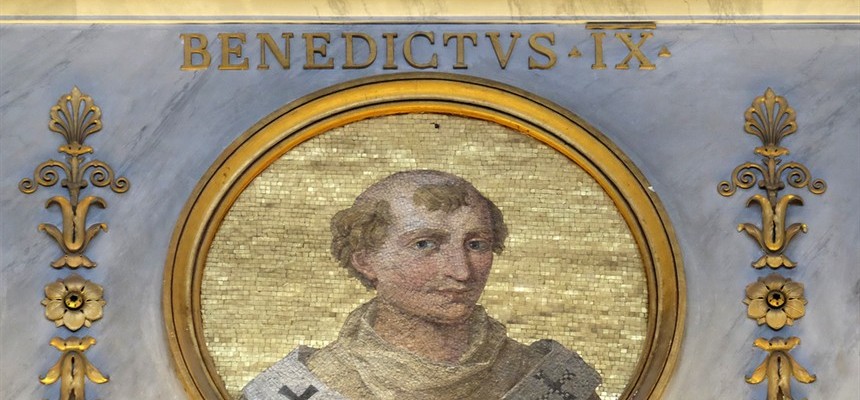
It was “all in the family” for the Tusculum counts. Brothers, Popes Benedict VIII and John XIX, ruled twenty years between them before dying. There was one brother left and he was filthy rich and very powerful. Wanting to keep the papacy in the family, he simply bought the election for his twenty-year old son. Rich kids tend to be spoiled then as well as now. This son, Theophylactus of Tusulum, was spoiled rotten. He was consecrated in October of 1032, within days of his uncle John’s death. He took the name his other uncle had taken, Benedict IX.
Together with his brother, Gregory, Benedict celebrated his way through four years of debauchery, theft and murder. By 1036, Romans had had enough and forced him out. But it did not take long before the pope got the Holy Roman Emperor Conrad to help him return to his palace and throne. It didn’t hurt that Benedict would help Conrad politically by excommunicating nobles who challenged the emperor.
The entitled youth returned to Rome as an entitled adult, continuing all his worse behavior. It took eight years before the Romans had the nerve to drive the man out of Rome. Benedict’s enemies chose Bishop John of Sabina to be elected, with the help of some bribery. He took the name of Sylvester III in early 1045. He did not reside in the Lateran Palace very long. By April, Benedict and his followers had expelled Sylvester and moved back in. But, now, Sylvester claimed to be the pope, still. Now there were two to deal with.
It did not take long for Benedict to realize that he really did not want to be pope anymore. He wanted to marry his cousin. So, he consulted with his godfather, the pious priest John Gratian. The deal was made that John would take over the papacy and pay Benedict a living wage, which was just about what was left in the papal coffers. Father Gratian became Pope Gregory VI. A pious, intelligent man was just what the Church needed and many rejoiced. However, within just a few months, Benedict’s heartthrob rejected him, and he decided that he really wanted his palace back. He tried to depose Gregory, who was acknowledged as the true pope.
Benedict gained the upper hand and ruled until July 1046. During that time, there were three popes claiming to be the real one, living in different parts of the city. Sylvester had not given up his claim. This was not a situation which could be tolerated.
Clergymen appealed to the young King Henry III of Germany, the son of the deceased Emperor Conrad. An energetic young man, reminiscent of King Otto the Great, Henry soon crossed the Brenner Pass into Italy that fall. He was met by members of the clergy. Troubled by all the conflict, Henry called a council to be immediately convened at Sutri in December. Gregory arrived to deliver testimony. Over one thousand bishops showed to render judgement. Benedict was determined to have no claim to the papacy since he had already abdicated. Sylvester was confined to a monastery. Gregory testified that he essentially bought the papacy, committing the sin of simony, and, thus, unqualified to continue. All three were deposed.
King Henry then proceeded to nominate one Suidger, Bishop of Bainberg, pope, with the blessings of the Roman senators. They admitted to a series of mistaken judgements and asked the king to make choices for them. Suidger took the name of Clement II and was consecrated on Christmas Day, 1046.
Henry moved Clement to Rome and was, in turn, crowned emperor within days. Clement spent ten months as pope before dying in October. This was the sign for Benedict, backed by Italian nobles, to seize the Lateran in November, making him pope, again. Driven away, finally, in July 1048, the German-backed Romans finally got rid of him for good.
Simony was not a charge to be taken lightly. Benedict was called to answer in court in late 1048, but he did not appear. He was excommunicated a few months later.
Eventually, Benedict must have given up his claim to the throne. Pope Leo IX is said to have lifted the ban on the ex-pope. Benedict moved to the Abbey of Grottafratta where he lived out the few years he had left. The abbot, St. Bartholomew of Grottafratta, said he was penitent and had turned away from his sins. He was buried at the abbey.
Thus went the influence of the Counts of Tusculum. The German emperors stepped in to try their influence.

Recent Comments